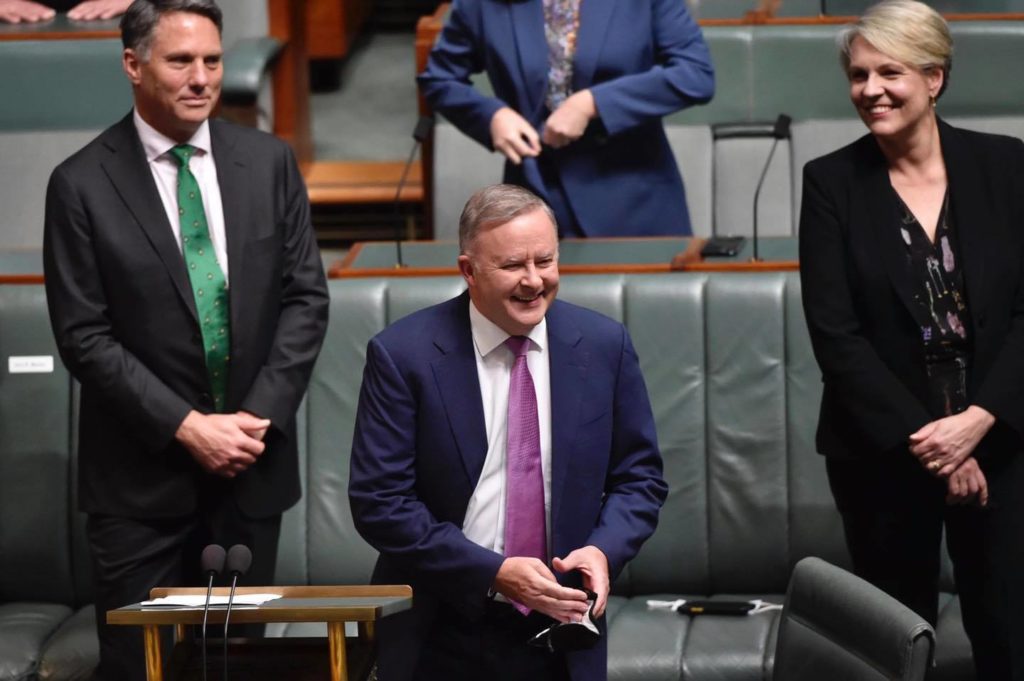That Labor might make child care reform a key part of its Federal Budget reply was flagged earlier in the week, confirmed on Thursday afternoon and on Thursday night the Opposition Leader Anthony Albanese did not disappoint.
Putting women at the heart of Labor’s plan to kickstart the economy and get Australians back to work is compelling politics and policy because of the adverse implications women have suffered out of COVID19. Addressing the economic reality women in Australia are facing is desperately needed.
Anthony Albanese chose to make women the priority in his Budget reply, not as a ‘footnote’ or worthy only of platitude. It was inspired and inspiring because he spoke with sincerity, nuance and understanding.
And, he backed it up with a targeted, significant path for change.
As has been highlighted from virtually all quarters in recent months, proposing substantive changes to early education and child care funding is the most effective way to deliver for women, children and the economy at the same time.
A point it seems Labor understands.
“Women are the key to kickstarting our economy again. In the worst recession in a hundred years, we have to make sure women aren’t forced to choose between their family and their jobs,” Albanese said. “We can’t just let fees and out-of-pocket costs keep skyrocketing. Labor has a plan to put more money in the family budget and help women get back to work, quickly. Working mothers should be able to afford child care for their kids. It’s as simple as that.”
It is.
“Labor created Medicare – universal health care.
Anthony Albanese in the Federal Budget Reply
We created the NDIS – universal support for people with disability.
We created superannuation – universal retirement savings for workers.
And – if I’m Prime Minister – I will make quality, affordable childcare universal too.“
Labor’s plan, the Working Family Childcare Boost, is designed to deal with the fact child care fees in Australia are some of the highest in the world and put more money into the pockets of working families, straight away.
“And it’s not welfare,” he said. “It’s structural reform.”
Labor would scrap the $10,560 child care subsidy cap which often sees women losing money from an extra day’s work, lift the maximum child care subsidy rate to 90 per cent and increase child care subsidy rates and taper them for every family earning less than $530,000.
It would mean 97% of all families in the system will save between $600 to $2,900 a year and no family would be worse off.
But, critically, there is also a plan to pursue structural change.
The Productivity Commission would conduct a comprehensive review of the sector with the aim of implementing a universal 90% subsidy for all families.
The ACCC would design a price regulation mechanism to shed light on costs and fees and drive them down for good, and also examine the relationship between funding, fees, profits and educators’ salaries.
The Shadow Minister for Early Childhood Education Amanda Rishworth said the case for this reform is clear.
“The overwhelming evidence is clear: more women in the labour force is good for the economy, and quality early education is better for our kids,” Rishworth said. “Women aren’t working when they could, and families keep struggling to pay the bills. Labor’s Working Family Child Care Boost is an economic reform Australia desperately needs to create jobs.”
This plan is exactly the kind of bold and visionary reform this crisis – and Australian women – urgently require. It is a plan with the capacity to benefit all Australians but to be potentially transformative for women and their ability to achieve financial security.
And it’s likely to be very warmly – and widely – welcomed by voters.
Last month, a national poll by Essential Research found a majority of Australians (65%) support an early childhood education system that is accessible to everyone, and integrated with our public education system.
The majority support for the proposal was across all ages, states and political affiliation.
Universal, quality early learning is the most compelling, valuable policy any government could pursue to ensure Australia’s recovery from COVID-19 leads to a healthier, more equitable and more sustainable future.
Here’s hoping the Federal government is inspired to consider this proposal – and follow Labor’s lead.
Georgie Dent is Executive Director of The Parenthood and a contributing editor on Women’s Agenda.


